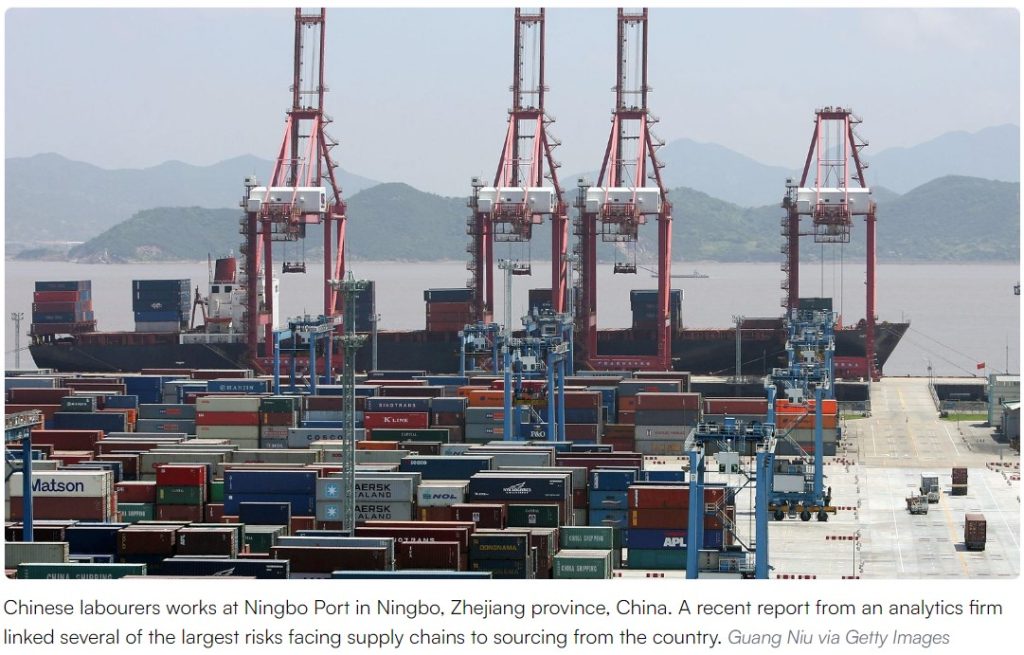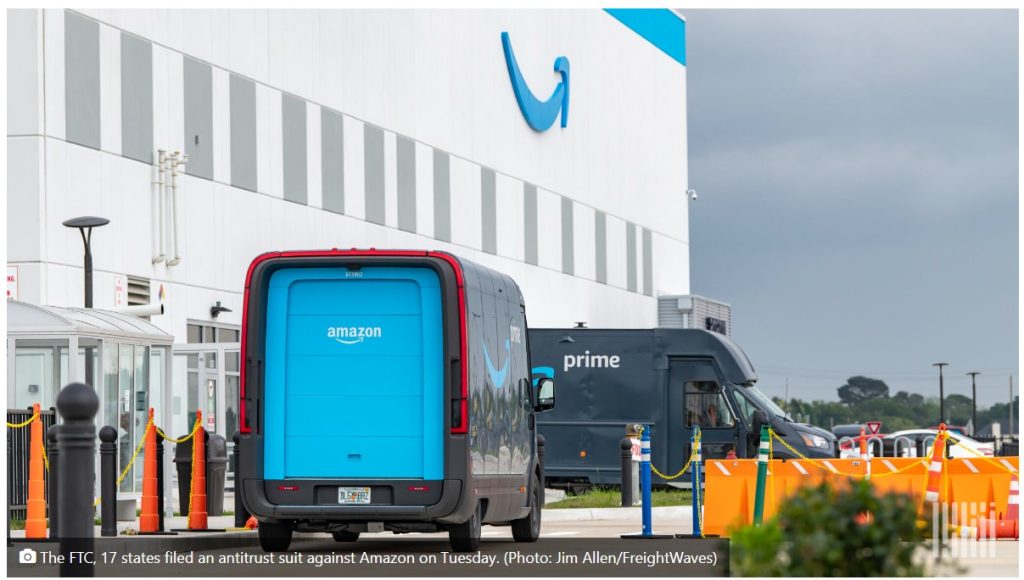
80/20 of E-commerce September 29, 2023
Hey Everyone,
This week we will dive into the Amazon antitrust lawsuit, where the FTC and 17 states are challenging its dominance, and explore Amazon’s response, assessing its potential impact on sellers. As we gear up for the holiday shopping season, we’ll also touch on Mastercard’s forecast of a 3.7% increase in holiday spending. For shipping and logistics news, UPS is set to hire 100,000 seasonal workers. Additionally, if you need a sourcing agent from China for your business needs, we’ve got you covered.
Are you Looking for a Sourcing Agent in China?
Are you in search of a trusted sourcing agent in China? Look no further! We have a highly experienced professional ready to assist you. Whether you’re seeking manufacturing partners, quality control, or supply chain solutions, our experts can guide you.

Click the link to access our sourcing request form and let us connect you with the ideal partner for your needs: https://www.8020sourcing.com/sourcing-request/
Your journey to successful sourcing starts here!
Amazon Faces Antitrust Lawsuit from FTC and 17 States
Amazon is facing a major antitrust lawsuit from the Federal Trade Commission (FTC) and 17 states in the US. The lawsuit alleges that Amazon has abused its dominant position in the e-commerce market by imposing unfair and anti-competitive practices on third-party sellers who use its platform.
According to the FTC, Amazon has violated the Sherman Act and the Clayton Act by requiring third-party sellers to agree to a “most favored nation” clause, which prevents them from offering lower prices or better terms on other platforms, including their own websites. This clause effectively locks sellers into Amazon’s ecosystem and limits their ability to compete and innovate.

The lawsuit also claims that Amazon has engaged in self-preferencing by using its access to data and analytics to promote its own products and services over those of third-party sellers. Additionally, the lawsuit accuses Amazon of imposing excessive fees and penalties on sellers, restricting their communication with customers, and suspending or terminating their accounts without due process.
The FTC and the 17 states are seeking various remedies, including injunctive relief to stop Amazon’s unlawful conduct, monetary relief to restore competition and compensate harmed sellers, and structural relief to break up or divest parts of Amazon’s business.
TAKEAWAY: This lawsuit is a significant challenge for Amazon and could have major implications for the e-commerce industry as a whole. If successful, it could force Amazon to change its policies and practices, lower its fees, and open up more opportunities for third-party sellers to compete and grow. As an e-commerce seller, you should keep an eye on this case and be prepared for any potential changes in the market.
Amazon Responds to FTC Antitrust Lawsuit – Would This Help or Hurt Your Business?
Amazon has issued a full response to the Federal Trade Commission’s (FTC) antitrust lawsuit. In Amazon’s full response to the FTC, Amazon strongly defends its position, asserting that the FTC’s claims are baseless, flawed, and lack evidence. Amazon argues that it has helped millions of small and medium-sized businesses grow and succeed by providing them with access to a large and loyal customer base, low-cost fulfillment services, and various tools and programs. Amazon also asserts that it faces intense competition from other online and offline retailers and that it always puts customers first by offering them low prices, fast delivery, and a wide selection of products.
This lawsuit centers around allegations of anti-competitive practices within Amazon’s platform, impacting e-commerce sellers. It’s a complex legal battle with potentially far-reaching consequences, highlighting the ongoing scrutiny of tech giants and their role in the e-commerce landscape.

Amazon is facing pressure from some authorities to break up its business, due to its dominance in the e-commerce industry. The idea of splitting up Amazon is not a simple or straightforward one. It could have both positive and negative impacts on the e-commerce industry.
Some people think that breaking up Amazon would be good for the e-commerce market, as it would create more competition and innovation, reduce Amazon’s control over third-party sellers, and prevent Amazon from favoring its own products or services. Others think that breaking up Amazon would be bad for the e-commerce market, as it would disrupt the efficiency and convenience of Amazon’s operations and offerings, increase the costs and complexity of doing business on Amazon or other platforms, and create uncertainty and confusion for both consumers and sellers.
TAKEAWAY: While the outcome of the Amazon vs. FTC lawsuit remains uncertain, it’s a stern reminder that the e-commerce environment is evolving, and legal matters can impact your business. It’s important to stay informed about industry regulations and market dynamics. Keep a watchful eye on developments to make informed decisions for your business.
Holiday Spending to Increase 3.7%
The holiday season is upon us, and with it comes a prime opportunity to boost your e-commerce sales. According to a recent report by Mastercard SpendingPulse, holiday retail sales in the US are projected to surge by 7.4% compared to last year, reaching an all-time high of $859 billion. It’s a promising outlook for business owners eager to capitalize on the festive season.

According to this report, E-commerce sales are expected to make up a significant 18.5% of total retail sales, up from 14.6% the previous year. This highlights the growing preference for online shopping, underscoring the importance of having a fast, user-friendly, and secure website.
Inflation, especially affecting categories like apparel, jewelry, and electronics, will impact consumer spending. To navigate this challenge, it’s essential to craft a thoughtful pricing strategy and consider offering discounts or incentives that attract and retain customers.
Additionally, in-store sales are set to rebound by 6.6% as consumers seek social experiences and convenience. To tap into this trend, consider providing omnichannel options such as “buy online, pick up in-store” (BOPIS) or convenient curbside pickup.
TAKEAWAY: As an e-commerce seller, staying informed about holiday spending trends and being agile in your strategy can be the difference-maker for a successful season.
UPS to Hire 100,000 Seasonal Workers for Peak
As the holiday season approaches, UPS has recently announced its plans to hire more than 100,000 seasonal workers to support the peak holiday shipping demand.
UPS said it is filling full- and part-time seasonal positions, mainly seasonal delivery drivers, CDL holders, and package handlers. The company also said that permanent positions are available in some areas for those who apply early. In fact, nearly 50,000 seasonal employees have earned permanent positions at UPS over the past two years.

The application process for seasonal workers at UPS is fast and easy. Most applicants will have an offer in hand within 25 minutes of completing an online application1. Nearly 80% of seasonal positions do not require an interview.
TAKEAWAY: The parcel delivery industry is expecting a busy and challenging holiday season as e-commerce continues to grow and consumers shop online more than ever. As an e-commerce seller, you should be aware of the potential impact of this peak season on your business, such as shipping delays, higher costs, and increased competition. Consider how you can leverage the opportunities that this peak season offers, such as reaching new customers, offering promotions and discounts, and providing excellent customer service.
In case you missed it:
- China Sourcing News: Weeklong Holiday Approaching with Possible Factory Shutdowns – Sept 29 – Oct 6
- Amazon Prime Big Deal Days Announced – Oct 10-11
- Walmart, Target, Best Buy follow Amazon with Early Start to Holiday Sales
- Amazon May Drop 2% Fees for Using New ‘Seller Fulfilled Prime’ Program
- TikTok Shop to Rival Amazon with Early Black Friday Deals
- WEBINAR REPLAY: “We’ve SOLVED Amazon’s Ranking Algorithm: Step-by-step Instructions to Dominate your Niche” feat. Brandon Young
- Unlock the Secrets of E-commerce Success Today! – “Quit Stalling and Build Your Brand. You Don’t Need an MBA to Crush it in E-Commerce”
Until next week!
– Gary
Act Now to Get LIFETIME ACCESS to All World Class 7 Figure Seller Summit Masterclass Sessions Plus $8,784 in Exclusive Bonuses
© 2021 7 Figure Seller Summit.